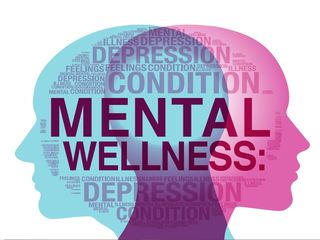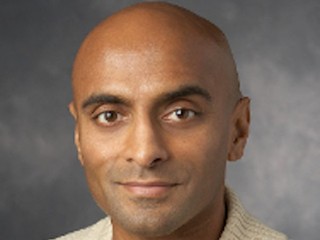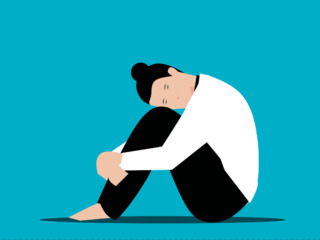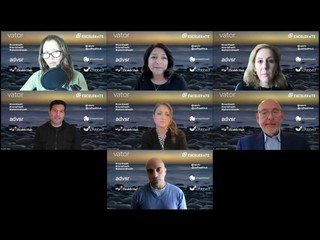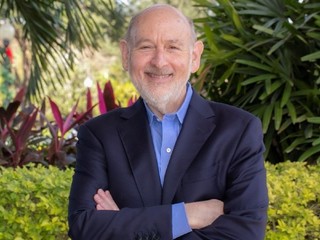
How conventional wisdom is damaging our mental health
At Invent Health, CEOs and physicians discussed how we need to rethink how we approach mental health
 At Vator's Future of Behavioral and Mental Health last month, the first panel of the day was called Mental Health post-Covid, and it consisted of a panel of CEOs and healthcare professionals talking about how Covid disrupted our lives and the collateral damage it caused, which can be seen in higher levels of confusion, stress, eating disorders, anxiety, and fragility.
At Vator's Future of Behavioral and Mental Health last month, the first panel of the day was called Mental Health post-Covid, and it consisted of a panel of CEOs and healthcare professionals talking about how Covid disrupted our lives and the collateral damage it caused, which can be seen in higher levels of confusion, stress, eating disorders, anxiety, and fragility.
In her introduction, Bambi Francisco, Vator's founder and CEO, and co-moderator of the panel, along with Dr. Archana Dubey, Chief Medical Officer at HP, stated that, "ultimately, it’s not data and gizmos that get us to a healthy mental state. It’s forgiving one another and training ourselves to move from grief to gratitude."
"Conventional wisdom says take your time and sit in your anger; conventional wisdom says you are worthy and you deserve the best, and you deserve safe spaces. Well, maybe conventional wisdom is wrong. The ways we treat the mentally ill are probably wrong; We’re probably also asking the wrong questions. Certainly in mental health, some say, we’re only treating symptoms," she said.
The panel consisted of Dr. Ram Duriseti, Clinical Associate professor of Emergency Medicine at Stanford; Russ Glass, CEO of Headspace Health; Dr. James Greenblatt, Chief Medical Officer of Walden Behavioral Care; Clarice Schillinger, Founder of Back to School USA; and Stephanie Tilenius, founder and CEO of Vida Health. Each of them addressed how they view the conventional wisdom and how they are attempting to defy it.
The first to discuss bucking the conventional wisdom was Dr. Greenblatt, who believes there's a silent epidemic of eating disorders and that well over half of the mental health problems are likely due to root causes that stem from nutritional and hormone deficiencies.
"I've been practicing child, adolescent, and adult psychiatrist for 30 years, so I've seen the sickest of our mental health community and this is not a new problem. I've been worried for about 10 to 15 years and in the past three years it's gone from worry to real panic. The pandemic was the perfect storm where rates increased, severity increased, deaths increased, hospitalizations increased, we have waiting lists now that we didn't three years ago, where most facilities around the country, actually the globe, dramatic increases in waiting lists. So, it was a perfect storm for these eating disorders," he said.
"What it helped me see in a very powerful light is concern about what the conventional wisdom, and what our treatment model is. For too long, I've been saying psychiatry, mental health has forgotten that we have a neck, that the body is connected to the brain. And as we begin to look at these malnourished kids, we're seeing such significant metabolic, hormonal, and nutritional problems that affect the brain."
At the same time, he noted, the outcomes of medication are poor, and the outcomes of therapy are variable.
"Our work is the integrative functional model, looking at these underlying root causes, and we have to try to integrate that into, not only our eating disorder world, where we have profoundly malnourished patients, but also into depression, anxiety, and major mental health conditions."
A little later on in the panel Francisco brought up a conversation she had with Duriseti about how the our healthcare approach over the last few years has been very top-down, very one-size-fits all, especially around vaccine and mask mandates and lockdowns and how "there's been very little discussion about whether we are doing the right thing."
"That has implications on how we conduct science, that has implications on how we conduct or approach healthcare and the healthcare protocols we have, that has implications on what we call evidence-based treatments," she said.
Duriseti responded by talking about experts and the way we think of them, which is usually in terms of degrees and credentials.
"That's not how to be an expert. Those things can confer particular training, but you can walk through a degree program and have learned little to nothing in terms of applicable skills when you're challenged with something that's novel and different. The way I look at expertise is an expert is someone who, when faced with uncertainty, is more right than wrong," he said.
"If we're faced with certainty, more often than not, we don't really need someone's opinion. Granted, sometimes what we're describing as 'certain' is not certain, but there are clear circumstances where that's the case. And, even then, if there's deviations they’re pretty minor. When we're talking about uncertainty, which we faced probably at a level that most of us haven't really experienced, in February and March of 2020, the way to approach that is an open mind and to gather opinions and to gather different thoughts."
Instead, Duriseti called the way it was it decided what is truth and what is correct as "authoritarian."
"If you've decided that there's a particular approach or policy that is clearly correct and you're dealing with a lot of uncertainty, at the very least you need to be humble enough to come back and reassess your priors. Were your priors correct? We knew very early on, certainly by May of 2020, that transmission in schools was very low. There are lots of physiologic reasons for this, and we know that studies since then have confirmed that. The current national conversation is we didn't know and that's wrong. That is wrong," he said.
"If we continue to try and engage in this what I call outright gaslighting, and I've been quoted as such in international articles, I don't hold back on this, we're not going to learn what we need to learn. We knew early on, and so we had ways of mitigating the harm."
Glass was asked next to discuss the conventional wisdom of how the mental healthcare system works, to which he responded that, "we’ve never really been attached to conventional wisdom," and how even early on the company went against the grain.
"Over a decade ago, the recognition was there that measurement wasn't really a thing in mental health, certainly not at any sort of scale, and so there was no way to, in a focused way, use data to improve. If you're not measuring it, there's no such thing as improvement; there are even some studies from back then that show any measurement at all doesn't require any action on that measurement. Any measurement at all leads to 25% better outcomes in adults. So, all you have to do is actually measure, ignore it you're still gonna get better outcomes," he said.
Ginger, the company Glass founded before merging with Headspace last year, challenged that by doing measurements, by actually collecting data using mobile devices, to figure out if that data is predictive in any way.
"The first goal was actually to provide providers with data, make it easy to collect, and then let them make decisions based on that. We very quickly realized, ‘okay, measurement is important, but it's not the most important thing, the most important thing is access.’ That's where we've really spent the vast majority of our time and when you look at what's happened over the last period, it's an interesting dichotomy," said Glass.
"Again, let's get away from conventional wisdom: the pandemic has actually been positive from an access standpoint. The pandemic has forced those who said, ‘you can't do therapy using telehealth, you need to see someone in person.’ Turns out that's not not only not true, but the outcomes are as good, if not better, and a lot of that just comes down to people being willing to show up."
Telehealth is especially important in the 50% of counties that have no mental health providers within county lines; even for those counties where there is a mental health provider, everybody knows everybody, so they know who is seeing the county psychiatrist, meaning there's no privacy there and so it makes it very difficult for people.
"The pandemic, I believe, has shifted forever the understanding that telehealth works, that you can be very successful treating things virtually, and that's been a wonderful shift in perception and understanding. Again, I'll caveat, there are certainly some conditions that need inpatient care in person, but the vast majority of mental health care can happen via telehealth and that's been a huge positive."
Tilenius also spoke about the ways the pandemic challenged the conventional wisdom around mental health, pointing out that there has been a recognition not just that mental health is pervasively needed, but also that there's a connection between the mind and the body.
"The people who were admitted to hospitals, and who died from COVID, had underlying diabetes and hypertension and depression and anxiety. So, there's a recognition of the mind and the body connected," she said, noting that Vida has known this for a long time; the company first started with cardiometabolic diabetes, and righ away had its coaches and dietitians and registered diabetes educators telling the company that they couldn't treat diabetes without treating depression, and vice versa.
"If you look at individuals that are between $10 and $20,000 annually in the system, and they have co-occurring chronic disease, like diabetes or hypertension or hyperlipidemia, with depression and anxiety, they tend to be four to six times more expensive, and so we have to treat both together. That's coming to the forefront as well from the pandemic because we were stuck at home, and physical and mental health all came together," said Tilenius.
She also circled back to Glass's point about telehealth and mental health, and how well they work together.
"Telehealth peaked at 64% of visits in May of 2021 and then it went back down; once things opened up, people wanted to go see their doctor in person, and it went down to 20% but mental health stayed above 40%. People prefer mental health through telemedicine, through synchronous video, through asynchronous chat. You're seeing people really benefit from being in these different modalities where it is a tech enabled service; you're getting access to a provider, but you're using chat or instant connection or asynchronous chat, or you're using groups or things like that," she said.
"There's a lot of proof that and I don't think we're going back, ever. This is the way mental health should be treated going forward. There's also evidence that you need to think about them together, the mind and the body, and you can't isolate them. There's also recognition that mental health does drive a lot of the costs up: there's been a lot of fear, uncertainty, and doubt around how much impact mental health truly has on our whole healthcare system. And COVID changed that."
When it was his turn to speak, Greenblatt counted what Glass and Tilenius said a bit: though he agreed that improving access and telehealth are helping, he still noted that overdoses, addictions, and suicide rates are increasing.
"So, with all this improvement in the model and the access, there's still something wrong with this system. And that's why we need to rethink and add to the model. It's not just about access," he said.
When Dubey asked him if it's more about policy or politics, he responded that it's both.
"There's billions of dollars being thrown around, but where and how? Again, most of my work over the years has been just redefining the model and looking at more of a mind-body or biological approach to major mental illness: it is not just stress, there's major metabolic, genetic, nutritional, hormonal challenges," he said.
"COVID, with all of it's craziness in terms of policy and healthcare, it certainly made us rely on testing. We have all these tests at home, is it a cold or is it COVID? You go to a psychiatrist or mental health professional, there's no such thing as an objective test, there’s no blood test, there’s no x-ray, there's no way we examine what we're treating. As Russ said, doing anything in depression, you're going to get 20 to 30% people getting better, whether we call that placebo or therapeutic alliance, but there are 60% of patients that aren't getting better and we're calling those treatments refractory. And those are the ones drifting to homelessness and prisons, and to suicide and addiction. There's just a huge chunk of this conventional wisdom that I think is being ignored."
Francisco echoed some of the same sentiments, saying that while Glass was right that we need to have access, she questioned what exactly we have access to.
"If it's access to conventional wisdom and these old ways of treating or old ways of viewing the mind and body separately, then what are we really doing?" she asked, turning to Greenblatt to see if believes that, instead of a PHQ-9, patients should be getting a blood test to find out if they're deficient in vitamin D or some other nutrients.
"We're pretty clear that lifestyle and diet is going to help us live longer, and feel better when we get older. It's a struggle for parents with kids, particularly kids in poverty, eating healthy foods, and we've been through Flint and Mississippi and lead and copper profoundly affecting the mental health of these kids. So, some very simple nutritional testing can make a difference and very simple changes in our practices can support children onto a healthier path, and it's really just ignored, often until it's too late," he responded.
Dubey turned to Schillinger to get perspective, specifically asking her what the consequences of following the conventional wisdom were for children.
"The reality is that the majority of students do better with in person instruction, or some type of human interaction. It was said earlier on this webinar that we are all human and we need that interaction with people; during the two years of this lockdown, it became very obvious that our children need human interaction to really thrive in life. I'm not discounting homeschooling, what I'm saying is when everything was shut down, that's when it really became an issue. The churches and community centers and extracurriculars is where we really saw the rise in mental health," she said,
Part of the problem, she said, is that the government has money to help solve this, but isn't doing enough.
"We've had billions of dollars put into a fund for mental health for our schools, this money was was allocated, billions of dollars, and 15% is only spent. 85% is still sitting in the coffers waiting for someone to tell the government where to put this and where to spend it. While we have these brilliant people saying we have a true crisis here and our children and our adolescents and young adults need help, we're just sitting on billions of dollars. I challenge that our government becomes more urgent in these matters instead of just sitting on the sidelines."
Francisco added that the conventional wisdom prior to COVID was that teachers and the government would teach children, but, because of COVID, everyone had to home school their kids, which is increasing the participation of parents and their involvement in the education of their children, to which Schillinger acknowledged that the shift and why she believes it's happening.
"If you watch the news, you'll see the radical agendas that people are fighting, but I don't think that people should overlook that the reason parents got so involved is they would hear their children all day on the Zoom class. And sometimes, they would sit there all day and watch a movie. That's the reality of what was happening. Yes, we have radical agendas trying to be pushed in our classrooms, but also just the lack of engagement. So, across the nation, parents are demanding transparency and involvement in their child's education because of what they're seeing at home," Schillinger responded.
"They're seeing mental health, they're seeing a rise in gender dysphoria, a rise in anxiety, a rise in depression. All these things are just compiling and they look at the school and say, ‘you have more hours with my kid than I do, so there's something wrong here and I need to be more involved in ensuring that they are educated, and they have the purpose and the tools that they need to be successful.’ A lot of times our media is getting this very conflicted: parents just want to make sure their child, whatever level or whatever skill set they have, is being really capitalized on and making sure that the child feels confident and has purpose in who they are."
You can see the video of the panel here. Or you can listen to the audio here.
(Image source: dreamstime.com)
Related Companies, Investors, and Entrepreneurs

Archana Dubey, MD
Joined Vator on
Global Medical Director, Hewlett-Packard Enterprises
Stephanie Tilenius
Joined Vator on

James Greenblatt, MD
Joined Vator on

Russell Glass
Joined Vator on

Clarice Schillinger
Joined Vator on

